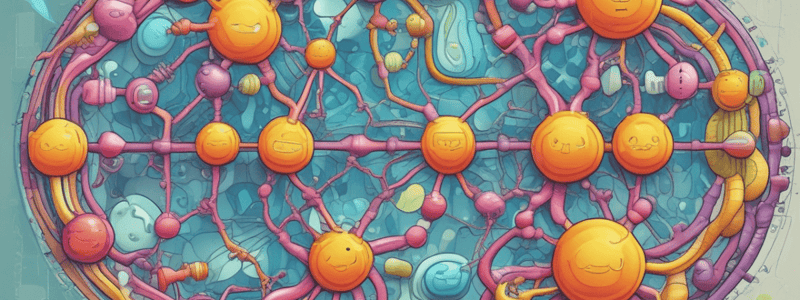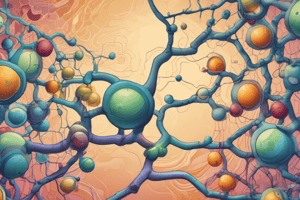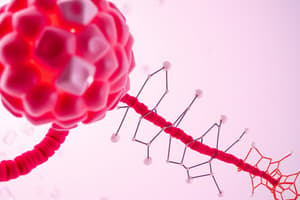Podcast
Questions and Answers
Where does fatty acid synthesis occur?
Where does fatty acid synthesis occur?
- Matrix
- Cytosol (correct)
- Mitochondria
- Nucleus
What enzyme converts acetyl-CoA to malonyl-CoA?
What enzyme converts acetyl-CoA to malonyl-CoA?
- Citrate synthase
- Fatty acid synthase
- Acetyl-CoA-carboxylase (correct)
- Malonyl-CoA transferase
How is acetyl-CoA moved from mitochondria to the cytosol for fatty acid synthesis?
How is acetyl-CoA moved from mitochondria to the cytosol for fatty acid synthesis?
- As citrate (correct)
- As oxaloacetate
- As malonyl-CoA
- As acetyl-CoA
What is the first product in the condensation step of fatty acid synthesis?
What is the first product in the condensation step of fatty acid synthesis?
What molecule is not involved in the fatty acid synthesis process?
What molecule is not involved in the fatty acid synthesis process?
Which product is generated from the dehydrogenation step in fatty acid breakdown?
Which product is generated from the dehydrogenation step in fatty acid breakdown?
What is the ultimate fate of the carbon skeleton from amino acid degradation?
What is the ultimate fate of the carbon skeleton from amino acid degradation?
To enter the urea cycle, the amino group must be converted into which compound?
To enter the urea cycle, the amino group must be converted into which compound?
What happens to the amino group after it is removed from the amino acid?
What happens to the amino group after it is removed from the amino acid?
What is the breakdown product of alanine in muscles?
What is the breakdown product of alanine in muscles?
What role does pyruvate play in the glucose-alanine cycle?
What role does pyruvate play in the glucose-alanine cycle?
What is produced when alanine reacts with alpha-ketoglutarate?
What is produced when alanine reacts with alpha-ketoglutarate?
Which enzyme is responsible for converting pyruvate and NH₂⁺ to alanine in muscles?
Which enzyme is responsible for converting pyruvate and NH₂⁺ to alanine in muscles?
Where is alanine converted back to pyruvate in the glucose-alanine cycle?
Where is alanine converted back to pyruvate in the glucose-alanine cycle?
Where are the protein complexes of the electron transport chain located?
Where are the protein complexes of the electron transport chain located?
What role does ATP synthase play in oxidative phosphorylation?
What role does ATP synthase play in oxidative phosphorylation?
Which molecule is reduced to H2O in the electron transport chain?
Which molecule is reduced to H2O in the electron transport chain?
Which co-factors are involved in the electron transport chain?
Which co-factors are involved in the electron transport chain?
What is the source of electrons for the electron transport chain?
What is the source of electrons for the electron transport chain?
What is the immediate consequence of proteins funneling H+ ions into the mitochondrial membrane space?
What is the immediate consequence of proteins funneling H+ ions into the mitochondrial membrane space?
What second step follows the transfer of energy from electrons during oxidative phosphorylation?
What second step follows the transfer of energy from electrons during oxidative phosphorylation?
What type of reaction is primarily involved in the electron transport chain's transfer of electrons?
What type of reaction is primarily involved in the electron transport chain's transfer of electrons?
What is the first step of the urea cycle?
What is the first step of the urea cycle?
Which enzyme class is responsible for the transfer of electrons via oxidation or reduction?
Which enzyme class is responsible for the transfer of electrons via oxidation or reduction?
Where does the asparate used in the urea cycle come from?
Where does the asparate used in the urea cycle come from?
Which process generates alphaketo skeletons that can enter the TCA cycle directly?
Which process generates alphaketo skeletons that can enter the TCA cycle directly?
What is generated in the last step of glycolysis pay-off phase?
What is generated in the last step of glycolysis pay-off phase?
Which of the following is not an example of an enzyme class listed in the table?
Which of the following is not an example of an enzyme class listed in the table?
Which process forms intermediates like fumarate in the urea cycle?
Which process forms intermediates like fumarate in the urea cycle?
What is added to the double bond at the beta carbon in the hydration step of β-oxidation?
What is added to the double bond at the beta carbon in the hydration step of β-oxidation?
How many Acetyl-CoA molecules are generated from the breakdown of a C16 fat (palmitate)?
How many Acetyl-CoA molecules are generated from the breakdown of a C16 fat (palmitate)?
Which molecule is generated during the first dehydrogenation step in β-oxidation?
Which molecule is generated during the first dehydrogenation step in β-oxidation?
What is the final product of the acyl transfer step in β-oxidation?
What is the final product of the acyl transfer step in β-oxidation?
Which of the following steps in β-oxidation involves the conversion of a double bond into a hydroxyl group?
Which of the following steps in β-oxidation involves the conversion of a double bond into a hydroxyl group?
Approximately how much ATP is generated from metabolizing palmitate?
Approximately how much ATP is generated from metabolizing palmitate?
During β-oxidation, which enzyme is used in the acyl transfer step?
During β-oxidation, which enzyme is used in the acyl transfer step?
How many β-oxidation cycles are required to fully break down a C16 fat (palmitate)?
How many β-oxidation cycles are required to fully break down a C16 fat (palmitate)?
What is the process of making glucose from pyruvate called?
What is the process of making glucose from pyruvate called?
Which enzyme is used during Step 5 of the TCA cycle?
Which enzyme is used during Step 5 of the TCA cycle?
What is generated in Step 4 of the TCA cycle?
What is generated in Step 4 of the TCA cycle?
What is the primary function of TCA in cellular respiration?
What is the primary function of TCA in cellular respiration?
Which step in the TCA cycle involves an isomerisation reaction?
Which step in the TCA cycle involves an isomerisation reaction?
What is the outcome of Step 3 of the TCA cycle?
What is the outcome of Step 3 of the TCA cycle?
What kind of reaction is involved in Step 7 of the TCA cycle?
What kind of reaction is involved in Step 7 of the TCA cycle?
Which molecule is regenerated in the last step of the TCA cycle?
Which molecule is regenerated in the last step of the TCA cycle?
How many ATP are produced net in glycolysis?
How many ATP are produced net in glycolysis?
What is the role of NADH and FADH2 in metabolism?
What is the role of NADH and FADH2 in metabolism?
What molecule is generated when fatty acids are first converted for β-oxidation?
What molecule is generated when fatty acids are first converted for β-oxidation?
What is the carrier molecule that transports fatty Acyl-CoA into the mitochondria?
What is the carrier molecule that transports fatty Acyl-CoA into the mitochondria?
Which step of β-oxidation involves the creation of a reactive double bond between the alpha and beta carbon?
Which step of β-oxidation involves the creation of a reactive double bond between the alpha and beta carbon?
Which molecule is an isomer of dihydroxyacetone phosphate?
Which molecule is an isomer of dihydroxyacetone phosphate?
What is the final product of Acyl-CoA breakdown in the citric acid cycle?
What is the final product of Acyl-CoA breakdown in the citric acid cycle?
Which process generates a significant amount of ATP by oxidizing glucose through stages including glycolysis and the TCA cycle?
Which process generates a significant amount of ATP by oxidizing glucose through stages including glycolysis and the TCA cycle?
What is the role of glutamate in the urea cycle?
What is the role of glutamate in the urea cycle?
What is the first step of the urea cycle?
What is the first step of the urea cycle?
Which amino acids can enter the TCA cycle directly?
Which amino acids can enter the TCA cycle directly?
Which molecule is produced during the pay-off phase of glycolysis?
Which molecule is produced during the pay-off phase of glycolysis?
What class of enzymes is responsible for the rearrangement of a single substrate?
What class of enzymes is responsible for the rearrangement of a single substrate?
From where does the second amino group in the urea cycle come?
From where does the second amino group in the urea cycle come?
Which step in the urea cycle involves the molecule ornithine?
Which step in the urea cycle involves the molecule ornithine?
Which molecule is generated as one of the intermediates in the urea cycle?
Which molecule is generated as one of the intermediates in the urea cycle?
Which enzyme class is involved in the transfer of chemical groups?
Which enzyme class is involved in the transfer of chemical groups?
Which molecule can be funneled from the TCA cycle into the urea cycle?
Which molecule can be funneled from the TCA cycle into the urea cycle?
Flashcards are hidden until you start studying
Study Notes
Fatty Acid Synthesis
- Fatty acid synthesis is NOT the reverse of fatty acid breakdown, with different enzymes involved
- Synthesis occurs in the cytosol, whereas breakdown occurs in the mitochondrial matrix
- Acetyl-CoA is converted to a 3-carbon malonyl CoA molecule by acetyl CoA-carboxylase
- The enzyme converts malonyl CoA to a longer chain by adding more Acetyl groups in consecutive reactions
Fatty Acid Synthesis Summary
- Condensation: Acetyl CoA (2C) + malonyl CoA (3C) → Acetyl group (2C), CO2, NADPH + H+
- Reduction: NADP+, H2O
- Dehydration: NADPH + H+
- Reduction: NADP+, Saturated acyl group (lengthened by 2C)
Fatty Acid Breakdown
- Dehydrogenation: Palmitoyl-CoA → FADH2
- Hydration: H2O
- Dehydrogenation: NADH + H+
- Acyl transfer: Acyl-CoA + acetyl CoA (2C)
Fatty Acid Synthesis: Getting Acetyl CoA
- Acetyl CoA is in the mitochondria, but fatty acid synthesis occurs in the cytosol
- Fatty acid breakdown generates energy from:
- Acetyl CoA (from fatty acids)
- NADH, FADH2 (from fatty acids)
- Glyceraldehyde-3-P (from glycerol)
- Fatty acid synthesis is not the reverse of breakdown
- There are many examples of integration of pathways
Breakdown of Amino Acids
- We don't store protein as energy; instead, we recycle them as amino acids
- Breakdown of amino acids:
- Carbon skeleton can be used as intermediates in the TCA cycle to generate energy
- Can be converted into glucose
Amino Acid Degradation and Nitrogen Excretion
- A.a.catabolism summary: waste removal, catabolism, recycling
- Carbon skeletons are converted into alphaketo acids, which can enter the citric cycle or be used to make glucose
- Amino groups are transferred to alphaketo glutamate, which enters the urea cycle
Breakdown to NH₄⁺
- For 19 amino acids, the amino group is transferred to alphaketo glutamate, generating glutamate
- The last one is the breakdown of alanine, which generates pyruvate
Breakdown to NH₄⁺: Glucose-Alanine Cycle
- Rapidly contracting muscle generates excess pyruvate and NH2+
- Converted to alanine by amino-transferase (reverse reaction)
- Alanine is transported to the liver and converted to pyruvate by amino-transferase (forward reaction)
- Pyruvate is converted to glucose by gluconeogenesis, which is then transported back to the muscle for glycolysis to generate energy
Fats: β-Oxidation
- 4 steps:
- Dehydrogenation: FADH2
- Hydration: H2O
- Dehydrogenation: NADH
- Acyl transfer: Acetyl-CoA
β-Oxidation Summary
- Breakdown of C16 fat (palmitate) requires 7 β-oxidations, generating:
- 8 Acetyl-CoA
- 7 NADH
- 7 FADH2
- Metabolism of palmitate generates approximately 106 ATP
Urea Cycle
- First step: generating carbamoyl phosphate
- Amino group is transferred to alphaketo glutamate, generating glutamate
- Glutamate is used to shuttle the amino group around
- The urea cycle uses aspartate, which is generated from oxaloacetate in the TCA cycle
Krebs Cycle (TCA Cycle)
- Glucogenic amino acids → alphaketo skeletons that generate energy
- Ketogenic amino acids → don't have to go as far as some other mechanism generates this process
Glycolysis
- Preparatory: Glucose → Glyceraldehyde 3-phosphate
- Pay-off: Glyceraldehyde 3-phosphate → Pyruvate
Enzymes/Delta G
- Oxidoreductases: transfer electrons via oxidation or reduction
- Transferases: transfer chemical groups from one molecule to another
- Hydrolases: cleavage of a substrate using water (hydrolysis)
- Lyases: addition of groups to double bonds or formation of double bonds following removal of groups
- Isomerases: rearrangement of a single substrate, generating isoforms
- Ligases: joining of two substrates, often by eliminating water
Studying That Suits You
Use AI to generate personalized quizzes and flashcards to suit your learning preferences.




